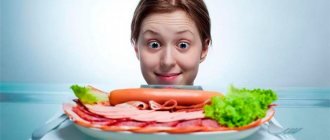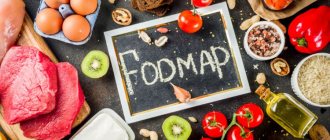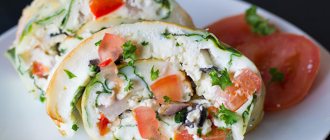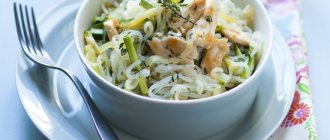The importance of a balanced diet
A balanced diet allows you to normalize the functioning of the gastrointestinal tract and control weight. Many experts recommend diet No. 3 for constipation. It is aimed at normalizing intestinal functions and metabolic processes in the body. A diet for constipation and bloating involves eating food at least 4 times a day. In this case, the daily amount of food should not exceed three kilograms. You need to drink at least 1.5 liters of fluid per day. Breakfast, lunch, afternoon snack and dinner should include healthy foods that contain proportional amounts of fats, proteins and carbohydrates. It is advisable to minimize the consumption of sugar and salt.
Up to contents
Treatment of constipation
Therapeutic measures begin with emptying the intestines using an enema or lactulose drug. The treatment regimen is developed individually depending on the causes, duration of constipation, your age and condition.
The doctor may recommend:
- diet changes: eating foods with a lot of fiber, increasing the daily volume of fluid to at least 2 liters per day, taking dietary bran;
- drug therapy:
- laxatives (herbal or synthetic) with gradual dose reduction and withdrawal;
- — prebiotics – to normalize intestinal flora;
- - antispasmodics;
measures to treat a disease whose symptom is constipation.
Treatment is aimed at restoring normal bowel movements and bowel functions, improving quality of life and preventing complications.
What can you eat and what can you not eat if you have constipation?
An approximate diet is prepared by a specialist and may include the following list of permitted foods:
| bread made from wholemeal wheat or rye flour | lean meat and fish, seafood (boiled or baked) | vegetables (beets, cabbage, carrots, tomatoes, sauerkraut, pumpkin, etc.) | berries (red rowan, lingonberry, gooseberry, blueberry, etc.) | honey and jam |
| vegetable non-rich soups | porridge with water (wheat, buckwheat, oatmeal) | low-fat dairy and fermented milk products (cottage cheese, milk, sour cream, fermented baked milk, etc.) | eggs (soft-boiled, in the form of an omelet) | vinaigrettes with vegetable oil |
| fruit compotes and decoctions of dried fruits, rose hips, wheat bran | herbs (celery, parsley, dill) | fruits (plum, apricot, melon, fig, etc.), both fresh and dried (prunes, dried apricots, etc.) | vegetable oils |
Prohibited products include:
| fresh white bread, bakery products from butter and puff pastry | “astringent” fruits (quince, pears, blueberries, pomegranate, lingonberries, dogwood) | soups made from rich and fatty broths | fatty dairy and fermented milk products | savory snacks |
| high fat dairy products | legumes | some drinks (coffee, cocoa, alcohol, strong tea, jelly) | hot seasonings (horseradish, pepper, mustard) | mushrooms |
| flour dishes (dumplings, dumplings, pies) | fatty meats and fish | vegetables that cause fermentation in the intestines (onions, radishes, turnips, garlic) | canned food | fried eggs |
| confectionery with rich cream | slimy porridges (rice, semolina) | some sweets (cakes, jellies, pastries, marmalade, chocolate, marshmallows) | smoked meats | mayonnaise, sauces |
Up to contents
Cooking methods and temperature conditions
As part of the diet for constipation, boiled and steamed foods are prescribed. You can also eat dishes baked in foil (without crust). For atonic constipation, food should be prepared in portions and not crushed. This helps enhance intestinal motility. It is recommended to exclude purees and minced meat dishes. This is due to the fact that these products do not stimulate intestinal motility. With spastic constipation in the elderly, on the contrary, food should be very soft so as not to provoke abdominal pain. The diet requires compliance with the temperature regime: you should eat food heated to 15–60 °C. Too hot or cold foods can irritate the stomach, and this, in turn, will negatively affect intestinal function.
Up to contents
Causes of irregular bowel movements
The protein diet has many disadvantages, but experts often recommend it for those who want to lose weight quickly. It is important to remember that you can stick to this diet without harm to your health for more than a few days.
American nutritionist Tori Armul managed to find the cause of constipation after a protein diet. In his opinion, it lies not in an excess of protein, but in a deficiency of soluble and insoluble fiber - fiber. It is found in large quantities in vegetables and fruits, which are not recommended to be eaten on a protein diet. Unlike plant foods, meat, fish and cheeses are digested almost completely, so there is simply nothing for feces to form from.
Diet for adults with spastic constipation
Spastic constipation occurs due to spasms in the intestines that prevent the excretion of feces. To eliminate this condition, it is recommended to eat minced meat, boiled fish, low-fat cheese, honey, olive oil, pasta, jam, vegetable puree, strawberries, grapes, figs, plums, melons, pears, oranges, tangerines. Lamb and beef, mayonnaise, smoked cheese, pastries, chocolate, sauces, cakes, salami and white bread should be excluded from the diet.
Sample menu for day No. 1
| Breakfast | a glass of low-fat milk, rye toast with honey and butter. |
| Lunch | a glass of apricot nectar and 2-3 cookies. |
| Dinner | creamy zucchini soup, chicken with spinach, brown bread, some fresh fruit. |
| Afternoon snack | 300 g prunes. |
| Dinner | a portion of carrot puree and 2 cutlets. |
Sample menu for day No. 2
| Breakfast | 1 bunch of grapes, St. John's wort decoction with honey. |
| Dinner | stewed eggplants with tomatoes, boiled fish, rye toast, some strawberries. |
| Afternoon snack | 2 cookies and a couple of spoons of jam |
| Dinner | pumpkin puree and rosehip infusion. |
Sample menu for day No. 3
| Breakfast | grape juice with wholemeal toast, butter and jam. |
| Dinner | chicken soup, pumpkin or mashed potatoes with chicken. |
| Afternoon snack | 300 g prunes. |
| Dinner | a glass of apricot nectar and an omelette with vegetables. |
Up to contents
Why do adults experience constipation when dieting?
Most diets involve eating small meals that are high in protein and low in carbohydrates. Such nutrition leads to certain consequences:
- Reducing the content of vegetables and fruits in the daily diet reduces the intake of dietary fiber into the body, which stimulates proper intestinal function. A lack of dietary fiber, which serves as a breeding ground for the proliferation of intestinal microflora, can lead to dysbiosis, which will aggravate problems with the digestive system.
- Small portions are almost completely absorbed by the adult body, which is accustomed to receiving more nutrients. As a result, the intestines stop contracting normally due to the small amount of contents and weak peristalsis. The result of the diet is constipation.
The caloric content of food is also of great importance. If you consume less than 800 kcal per day, the intestinal walls stop contracting. The adult body does not receive enough food, and as a result, constipation inevitably occurs when following a diet.
Diet for children and adults with atonic constipation
To normalize bowel movements, you need to regularly eat foods high in fiber, as well as consume enough fats to help contract the intestinal walls. Compared to the diet for spastic constipation, the diet for atonic constipation is less gentle.
The diet for bowel disease with constipation usually includes raw fruits and vegetables. They are rich in ballast substances such as cellulose and fiber. These substances adsorb water and irritate the intestinal nerve receptors, which, in turn, helps normalize peristalsis.
Sample menu for day No. 1
| Breakfast | vinaigrette with low-fat sour cream, a portion of boiled poultry, weak tea. |
| Dinner | cold beetroot soup, boiled or baked chicken with pearl barley porridge, some figs. |
| Afternoon snack | a glass of rosehip infusion, bran bread and a couple of teaspoons of honey. |
| Dinner | boiled fish with vegetable stew, one baked apple. |
Sample menu for day No. 2
| Breakfast | weak green tea, sandwiches with lean ham, cucumbers and tomatoes. |
| Dinner | tomato soup with brown rice and parsley, boiled turkey with fresh vegetables, a glass of freshly squeezed apple juice. |
| Afternoon snack | a few apricots, a couple of tablespoons of raisins, low-fat yogurt |
| Dinner | salad with egg, green beans and tomatoes, rosehip infusion. |
Sample menu for day No. 3
| Breakfast | oatmeal with water, tea with milk, toast with low-fat cheese. |
| Dinner | pureed cauliflower soup, low-fat baked fish, freshly squeezed carrot juice. |
| Afternoon snack | some figs, dried apricots and prunes. |
| Dinner | stewed vegetables, boiled turkey, flax seed decoction, apple. |
Up to contents
Causes of constipation on a diet
A decrease in the frequency of bowel movements may be due to disruption of bowel function. Other symptoms of constipation include hard, dry, fragmented stool; increased gas formation, pain during bowel movements, the need to strain and heaviness in the abdomen.
Constipation is the result of a change in your usual diet. Much depends on the specific diet. Thus, on diets that include the consumption of large amounts of raw fruits and vegetables, this problem is less common due to the enrichment of the diet with fiber.
Strict dietary restrictions for a long time will lead to a lack of minerals and vitamins. Deficiency, in turn, leads to changes in muscle tone, including intestinal motility disorders. Even with normal stool consistency, stool may move more slowly, making bowel movements infrequent.
Constipation is associated with three main mistakes when losing weight:
- Lack of fluid.
Water is an important component of biochemical processes in the body; it also takes part in the formation of stool consistency. If the volume of liquid drunk is less than 2 liters per day, systemic functions, including digestive functions, may deteriorate. It is important to drink water 30 minutes before meals and no earlier than 40 minutes after meals. - Insufficient amount of food.
Fasting is contrary to the principles of proper nutrition. A lack of nutrients is fraught with hypovitaminosis, fatigue, weakness, and the development of various complications. As a result of rare meals, so-called nutritional constipation develops. Remember that it is permissible to reduce the portion size, but you should not fast for a long time - you need to eat up to 6 times a day. It is advisable not to allow more than 5 hours between meals - remember, you can always have a snack. - Extremely poor diet.
The body must receive the daily norm of nutrients and fiber. A poor diet is typical of so-called mono-diets. You can’t eat only chicken breast or certain grains. The diet should include lean meat, fish and poultry, fresh vegetables and fruits, dairy products, a variety of grains, olive oil, etc.
It is worth mentioning a less common mistake made by patients, but one that occurs in the practice of gastroenterologists. Many women, in an effort to lose excess weight, use weight loss medications. Some of these remedies have a laxative effect. After a course of such remedies, patients begin to adhere to a diet so that the lost pounds do not return. However, diarrhea can permanently disable the intestines. A large volume of lost fluid, changes in motility and sensitivity of intestinal receptors lead to constipation when losing weight.
It is recommended to change the diet gradually, while in most cases those who want to lose weight make adjustments in one day. This is stressful for the body. The lack of variety of foods, for example, with the Dukan diet, forces you to eat monotonous dishes, which reduces the activity of the gastrointestinal tract.
The situation “I went on a diet - I started getting constipated” is also familiar to those who introduce into their usual menu dishes that delay stool: rice, crackers, potatoes, black tea, jelly, etc. Improper nutrition can not only not give the desired result, but on the contrary, lead to serious intestinal problems and even weight gain.
Small portions can cause changes in metabolic processes, and improper drinking regimen seriously aggravates the situation. Some dishes and foods have a certain diuretic effect, as a result of which a large loss of fluid triggers another mechanism for the formation of constipation - the feces become drier and denser.
Diet for chronic constipation
A diet for chronic constipation is an individual diet that includes the consumption of a large number of healthy foods that have a beneficial effect on a person’s health and promote the natural process of bowel movements. The list includes dried and fresh fruits, raw vegetables. Doctors advise including apricots, prunes, figs, freshly squeezed vegetable and fruit purees, as well as juices in your diet for constipation. It is advisable to eat them at least 4 times a week. Porridges made from gray and dark-colored grains (buckwheat, oats, barley) are healthy. They need to be cooked in water with the addition of a small amount of vegetable oil.
Sample menu for day No. 1
| Breakfast | low-fat cottage cheese, milk, sandwich with ham and tomato. |
| Dinner | borscht, boiled veal with baked vegetables, several apricots. |
| Afternoon snack | rosehip decoction with rowan jam, a couple of cookies. |
| Dinner | boiled fish , a couple of baked potatoes. |
Sample menu for day No. 2
| Breakfast | freshly squeezed carrot juice, egg white omelette. |
| Dinner | vegetable soup, mashed boiled beets with vegetable oil, wholemeal rye flour bread. |
| Afternoon snack | a glass of fermented baked milk and several loaves of wholemeal wheat flour. |
| Dinner | baked beef, fresh carrot salad with vegetable oil, baked potatoes. |
Sample menu for day No. 3
| Breakfast | beetroot soup, boiled brown rice, baked low-fat fish. |
| Dinner | beetroot soup, boiled brown rice, baked low-fat fish. |
| Afternoon snack | some dried fruits and freshly squeezed fruit juice. |
| Dinner | vegetable casserole, baked chicken breast. |
Up to contents
Symptoms of problems with bowel movements
The disease can manifest itself in different ways, depending on the causes and duration of the disease. This is why it is recommended to see a doctor. There are types such as acute and chronic constipation.
The first case is characterized by the following symptoms:
- inability to have a bowel movement for several days;
- inflammatory processes, diseases of the abdominal cavity;
- tumor processes.
With intestinal tumors and inflammatory processes, obstruction develops, leading to problems with bowel movements. If a patient has been diagnosed with hemorrhoids or anal fissures, the process of defecation may be accompanied by spotting and bleeding.
The second case is characterized by the following symptoms:
- the patient goes to the toilet independently only three times a week;
- dense feces;
- the patient is accompanied by feelings of incomplete emptying;
- forced bowel cleansing;
- straining during bowel movements.
The chronic form of constipation can be accompanied by not one, but several symptoms at once; the chronic stage occurs when the problem accompanies the patient for three months over the last six months.
Often patients with the chronic form complain of bloating, pain accompanied by contractions, cramps, an unpleasant taste in the mouth, and frequent belching.
It is important to immediately contact a doctor at Meditsina JSC (academician Roitberg’s clinic) in the Central District. Due to untimely contact with a specialist, a headache may be added to the main symptoms, the person will become irritable, and suffer from insomnia.
Consequences of not following the diet
Failure to follow the diet prescribed by your doctor as part of the treatment of frequent constipation can lead to complications, such as:
- megacolon (dilated and elongated intestine);
- chronic inflammation of the colon;
- intestinal obstruction;
- diseases of the rectum (fissures, hemorrhoids, paraproctitis);
- malignant tumors in the intestines.
Up to contents
The information in this article is for reference only and does not replace professional advice from a doctor. To make a diagnosis and prescribe treatment, consult a qualified specialist.
1 V.F. Privorotsky, N.E. Luppova. Modern approaches to the treatment of functional constipation in children // RZHGGK. – 2009. – T.19. – No. 1. – P.59–65.
Ways to combat constipation
With a protein diet, the body does not receive the required amount of fiber, which ensures regular bowel movements. To avoid bowel retention on a protein-rich diet, you can take the following measures.
- Develop a different power plan. Experts recommend alternating purely protein days with protein-carbohydrate days. Your diet should include vegetables and greens rich in fiber. Its fibers activate intestinal motility, normalize the balance of microflora and help cope with constipation.
- Drink more. The liquid helps to “cleanse” the intestines, stimulates metabolism and peristalsis.
- Move more. Sport has a beneficial effect on the body and helps cope with constipation.
- Add flaxseed, paraffin or olive oil to the menu.
An effective remedy for constipation, such as Fitomucil Norm, will also help to avoid intoxication. It allows you to cleanse the intestines of feces without side effects and is not addictive. It can be taken even by children over three years of age and pregnant women. Look for instructions in the package or on the website.










